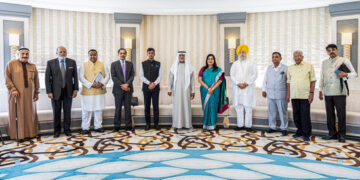India Deploys Seven Multi-Party Delegations to Global Capitals to Highlight Pakistan’s Links to Terrorism and Assert Zero-Tolerance Policy
In a coordinated diplomatic initiative, India is dispatching seven multi-party delegations to 33 key global capitals aimed at strengthening international understanding of Pakistan’s links to terrorism and reaffirming India’s steadfast zero-tolerance policy towards terror-related aggression. This outreach effort marks a significant step in India’s global diplomatic strategy following recent terror attacks and counterterrorism operations in Jammu and Kashmir.
All-Party Delegation Arrives in Russia to Cement Strategic Ties
The first of these delegations, led by Dravida Munnetra Kazhagam (DMK) MP Kanimozhi, arrived in Moscow on Thursday. The eight-member group includes representatives across the political spectrum: Samajwadi Party MP Rajeev Rai, National Conference MP Mian Altaf Ahmad, Bharatiya Janata Party (BJP) MP Captain Brijesh Chowta (Retd), Aam Aadmi Party (AAP) MP Ashok Kumar Mittal, alongside senior diplomats Ambassador Manjeev S Puri and Ambassador Jawed Ashraf.
On arrival, Samajwadi Party MP Rajeev Rai emphasized the historic friendship between India and Russia, stating, “Russia has stood with us during difficult times. Pakistan is not only a threat to India but to global peace and security. We have come to this trusted friend to share evidence and urge the international community to isolate Pakistan as a state sponsor of terrorism.”
DMK MP Kanimozhi underscored the delegation’s agenda of engaging with key Russian stakeholders, including the First Deputy Chair of the Committee on International Affairs Andre Denison, Chair of the State Duma Committee Leonid Slutsky, Russia’s Deputy Foreign Minister, and the Director of the Russian Institute for Statistical Studies, as well as former Russian Prime Minister Mikhail Yefimovich Fradkov. She noted plans to interact with Russian think tanks and media to effectively present India’s perspective on Pakistani aggression.
Delegations Spread Across UAE, Japan, and Beyond
Simultaneously, an all-party delegation led by Shiv Sena MP Shrikant Shinde is active in the United Arab Emirates (UAE). This group includes MPs Bansuri Swaraj, ET Mohmd Basheer, Atul Garg, Sasmit Patra, Manan Kumar Mishra, BJP leader Surendrajeet Singh Ahluwalia, and former Ambassador Sujan Chinoy. Addressing the Indian diaspora in Abu Dhabi, Shinde reaffirmed India’s new security posture: “Enough is enough. India will no longer tolerate terrorist activities. If our citizens are harmed, we will respond decisively.”
Shinde highlighted the strong ties between India and the UAE, emphasizing that the UAE understands India’s security concerns and the true nature of Pakistan’s destabilizing actions. He stressed the importance of this outreach in combating negative narratives on social media, stating, “Negativity spreads faster than positivity, but we are committed to changing the global perspective with facts and truth.”
BJD MP Sasmit Patra echoed these sentiments, asserting a unified Indian political voice: “We will ensure justice for victims of terrorism. This is the new India — united in thought and action against terror.”
Engagements in Japan Stress Global Cooperation Against Terrorism
In Japan, the delegation is led by Janata Dal (United) leader Sanjay Kumar Jha and includes BJP MPs Aparajita Sarangi, Brijlal, Pradhan Barua, and Hemang Joshi, Congress leader and former External Affairs Minister Salman Khurshid, Trinamool Congress MP Abhishek Banerjee, CPI(M)’s John Brittas, and former diplomat Mohan Kumar.
Jha held productive discussions with ambassadors and diplomats from Brazil, Australia, Colombia, Greece, and South Korea, emphasizing India’s resolve to counter terrorism and exposing Pakistan’s role in sponsoring terror activities globally. BJP MP Dr. Hemang Joshi described the first day of the delegation’s mission in Japan as “very fruitful,” highlighting the shared international concerns about terrorism.
Congress leader Salman Khurshid commented on the positive reception India’s anti-terrorism efforts received in Tokyo. He remarked, “There is unqualified support for India’s position. The key now is determining the next steps in international cooperation. We aim to ensure the countries we visit are fully sensitized to India’s concerns and willing to support feasible counterterrorism measures going forward.” Khurshid also pointed to the uncertain future of India-Pakistan relations, urging Islamabad to demonstrate genuine intentions toward peace.
Context: Recent Terror Incidents and Counterterrorism Operations
This diplomatic surge follows the Pahalgam terror attack and India’s Operation Sindoor, which targeted terrorist camps in Pakistan-administered territory. These events have sharpened India’s determination to rally global support in isolating Pakistan for its alleged role in sponsoring terrorism.
Shiv Sena MP Bansuri Swaraj, speaking from the UAE, called Operation Sindoor a symbol of India’s strength and resolve, stating, “The barbaric attack on April 22 was an assault on our faith and existence. Our decisive retaliation, targeting nine terror bases, sends a clear message: if war is brought to our doorstep, we will end it.”
Broad-Based Political Unity Behind India’s Diplomatic Outreach
The participation of members from diverse political parties — including DMK, SP, BJP, AAP, Congress, TMC, CPI(M), BJD, and JD(U) — reflects a unified Indian parliamentary front focused on national security and global diplomacy. This bipartisan approach aims to convey India’s zero-tolerance policy on terrorism credibly and effectively to international partners.
Objectives and Future Outlook
India’s multi-pronged diplomatic campaign seeks to achieve several goals:
- Garner global acknowledgment of Pakistan’s involvement in terrorism.
- Strengthen bilateral and multilateral cooperation in counterterrorism efforts.
- Address and counter misinformation and negative narratives on social media and international forums.
- Mobilize support for India’s security policies and military responses.
- Promote peace and stability in the South Asian region through global partnership.
As the delegations continue their visits over the next two weeks, India hopes to solidify a worldwide consensus condemning terrorism and Pakistan’s complicity, thereby fostering a safer international environment.
Also Read : Cannes 2025: Aishwarya Rai Gracefully Avoids Wardrobe Malfunction After Helen Mirren Steps on Her Cape















 Categories
Categories









